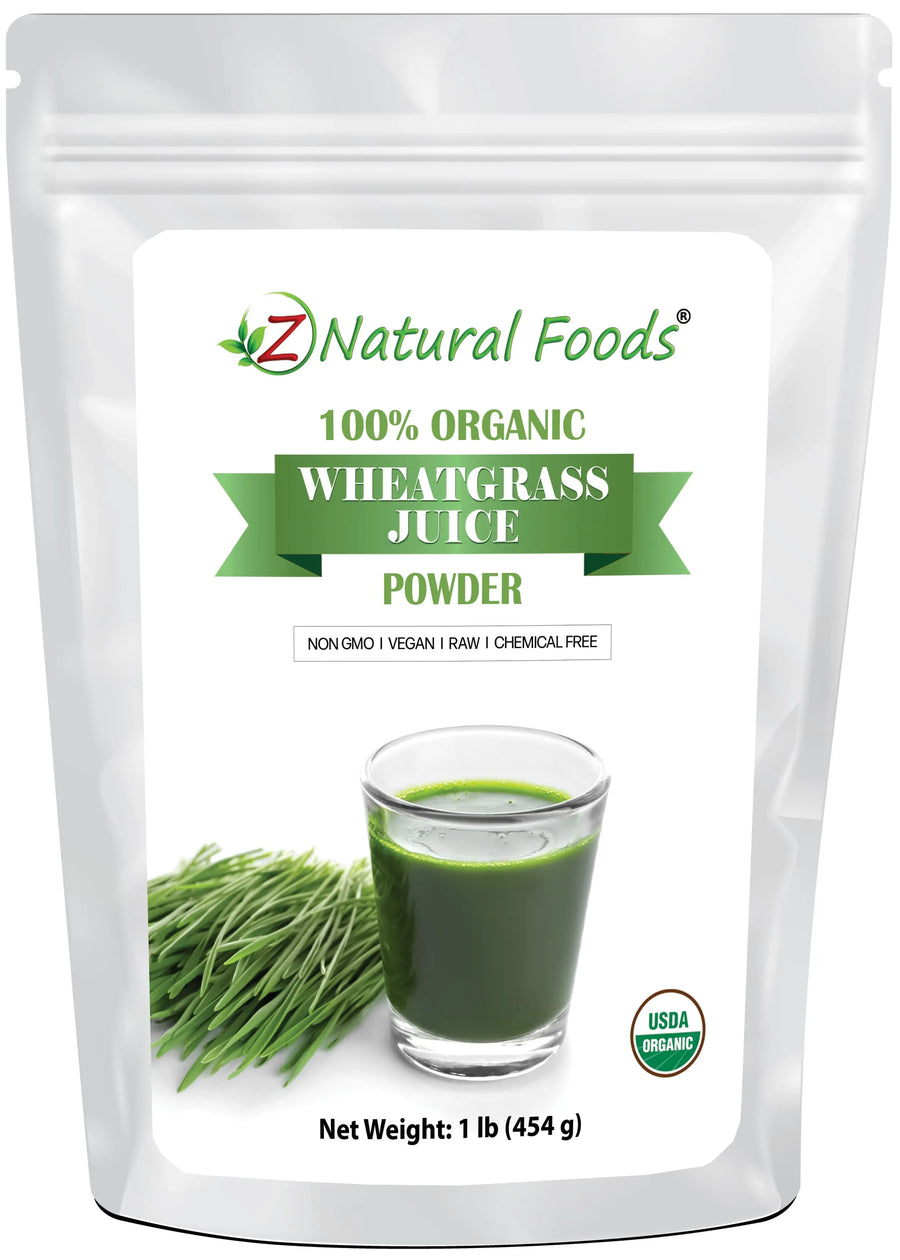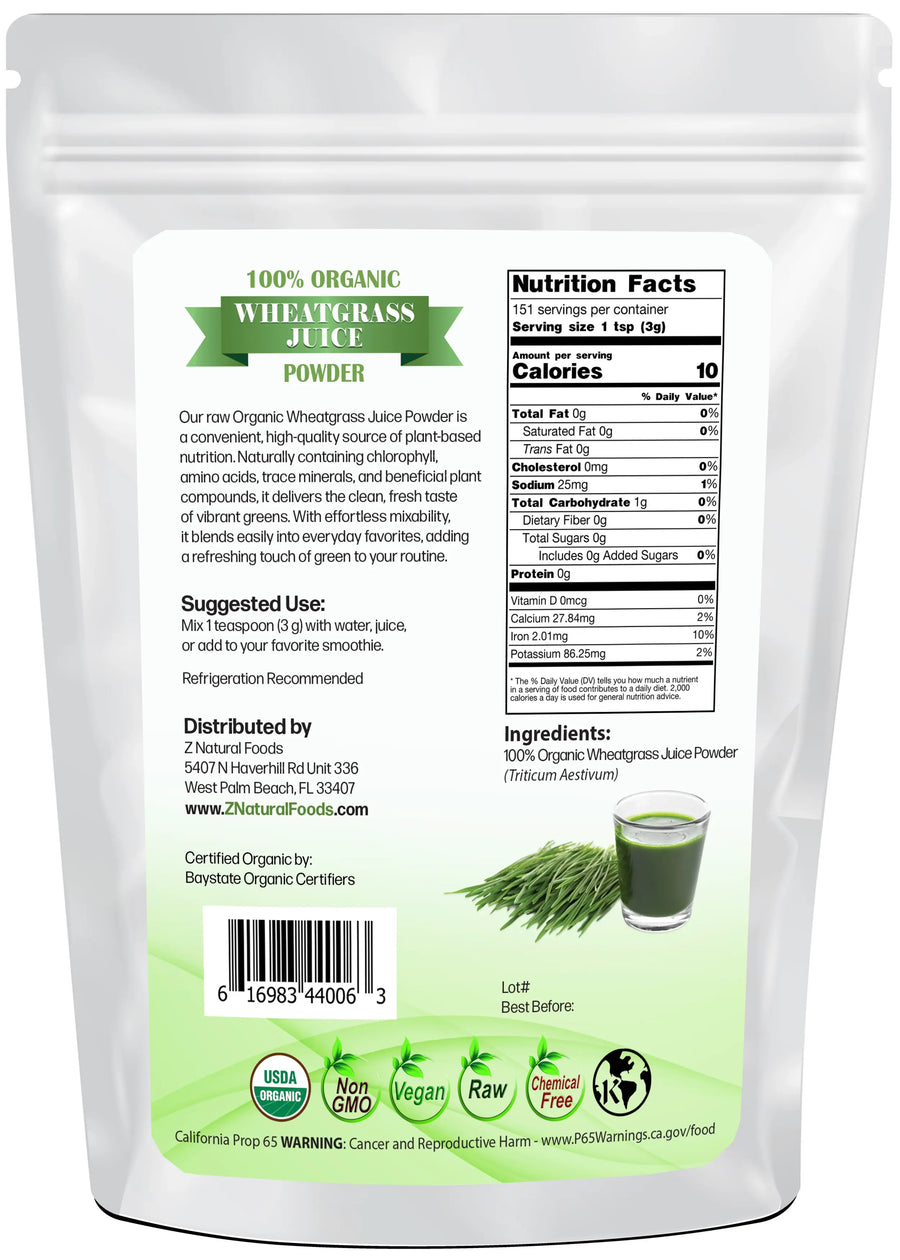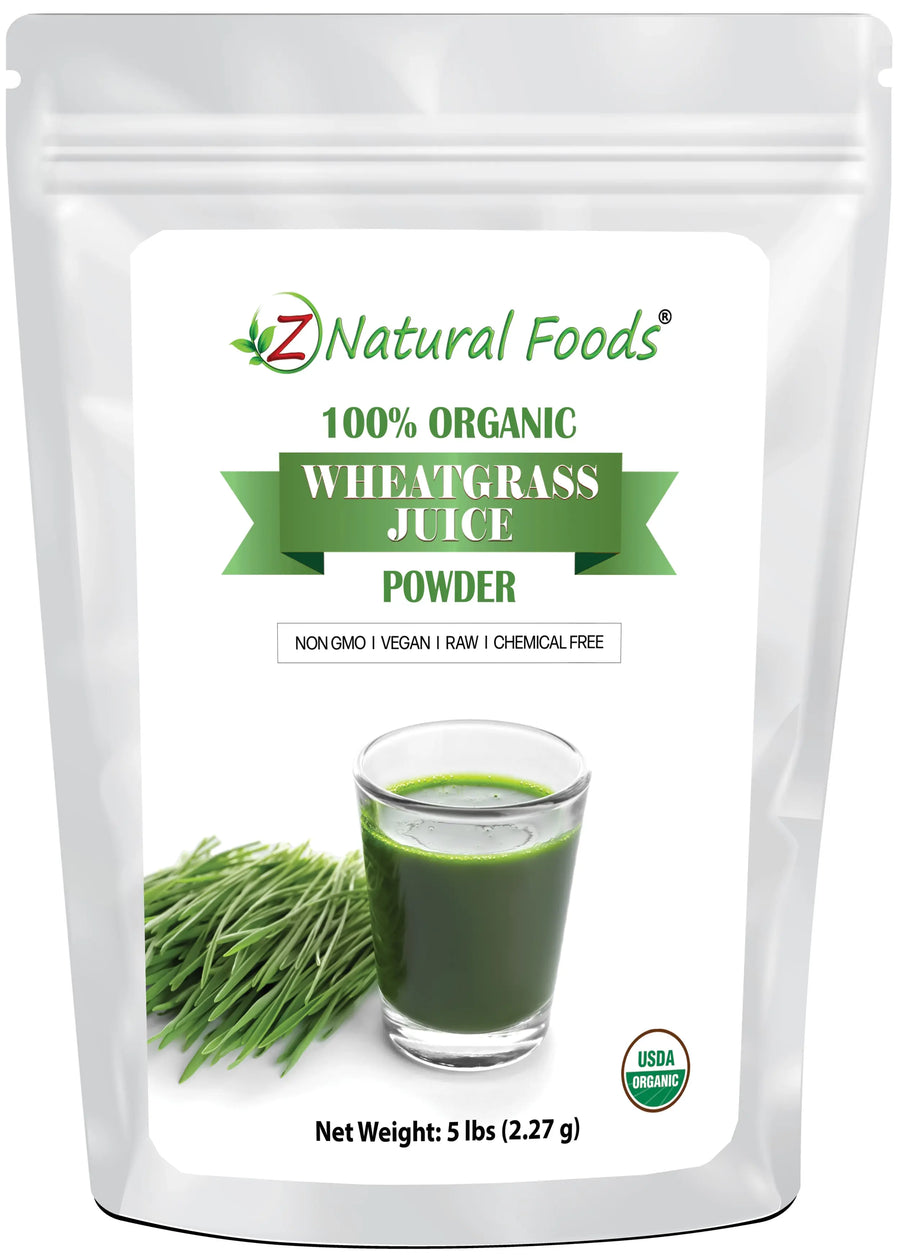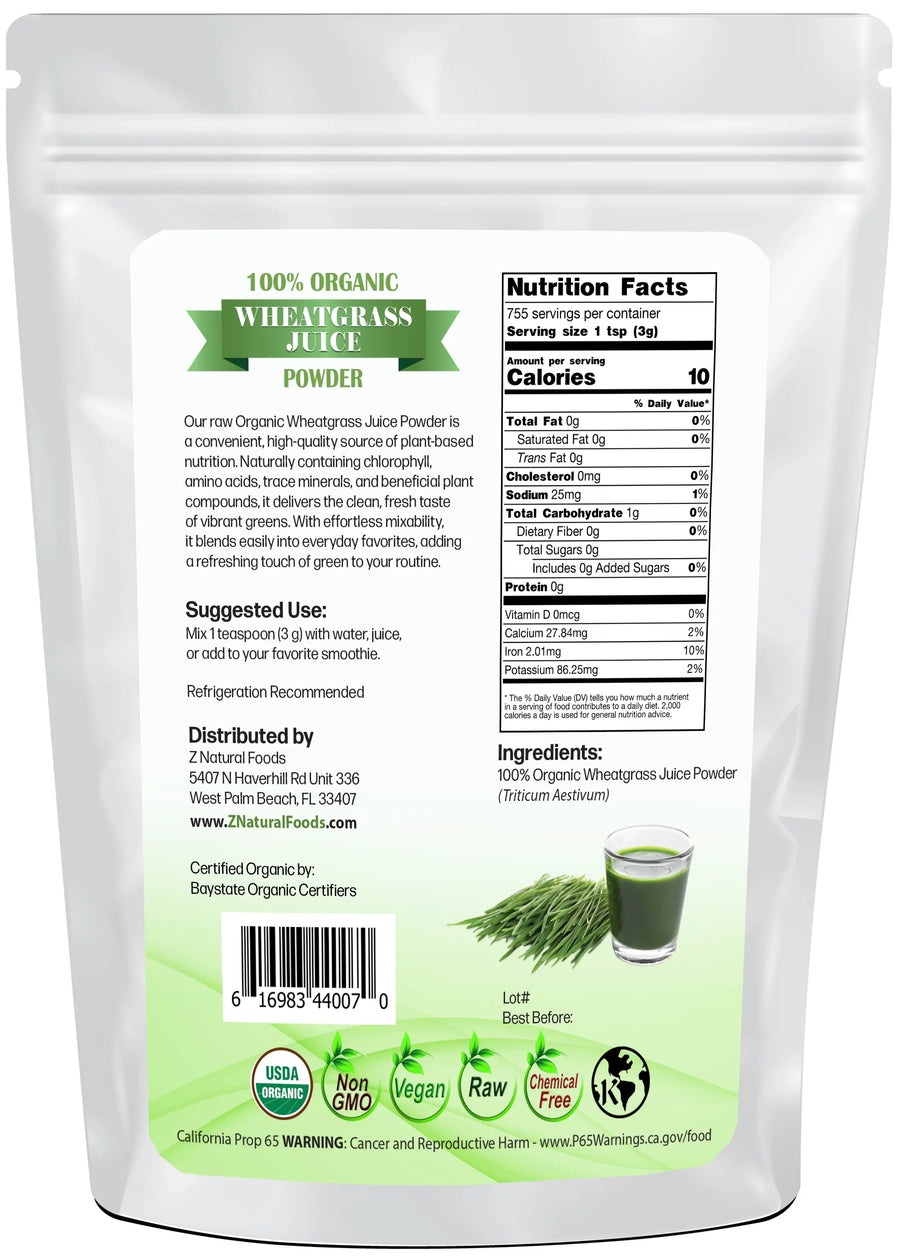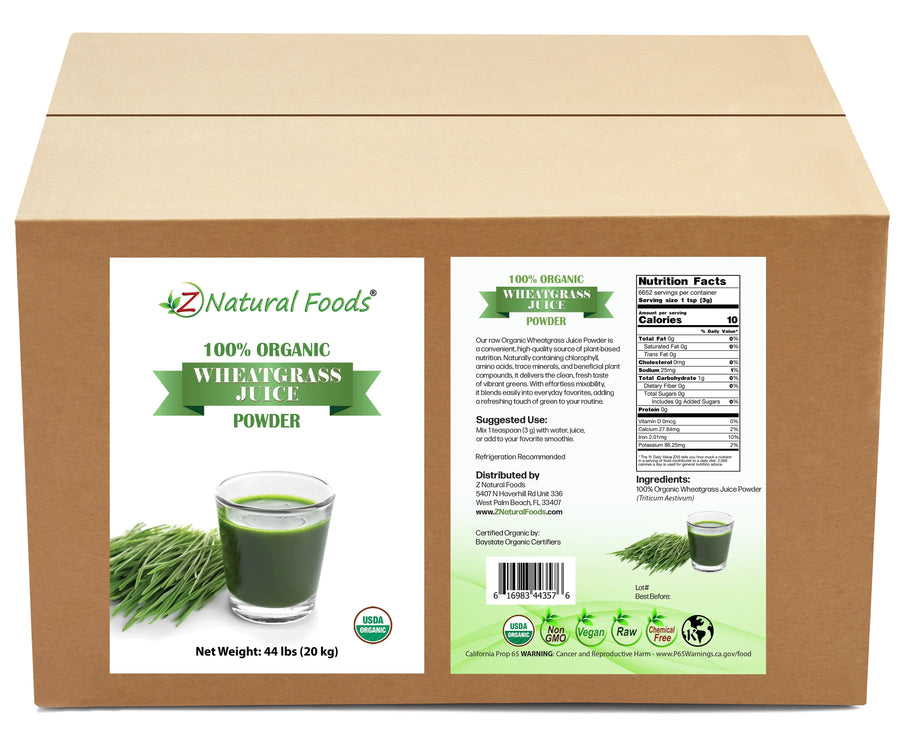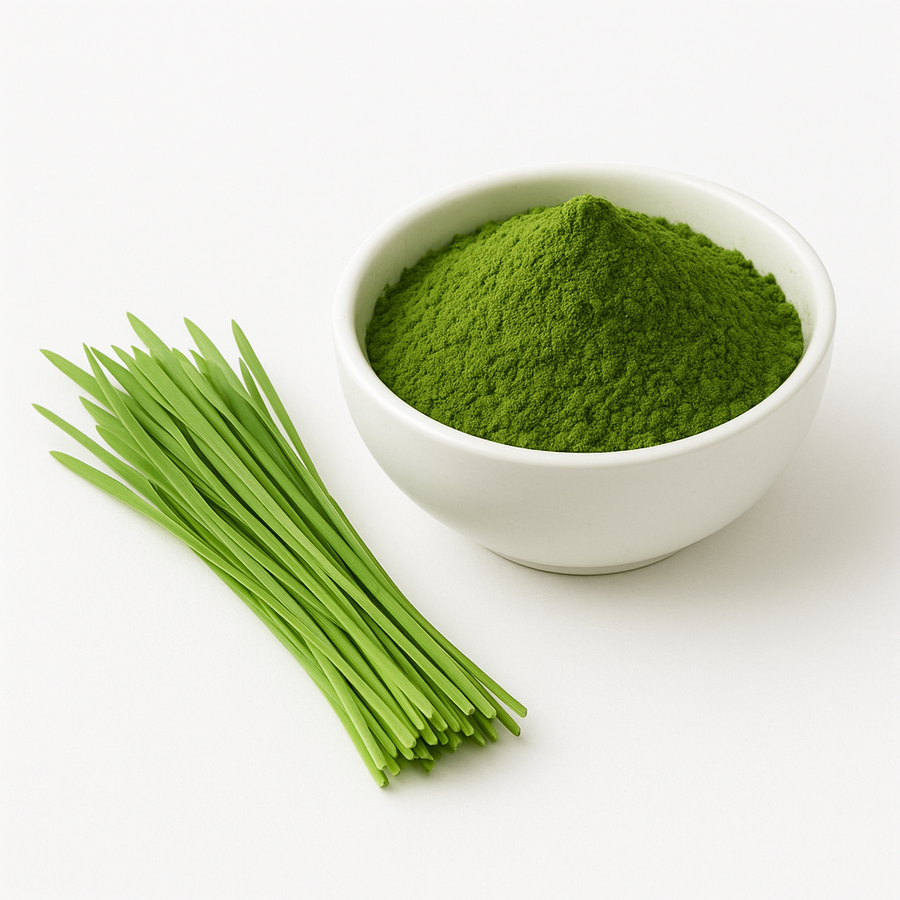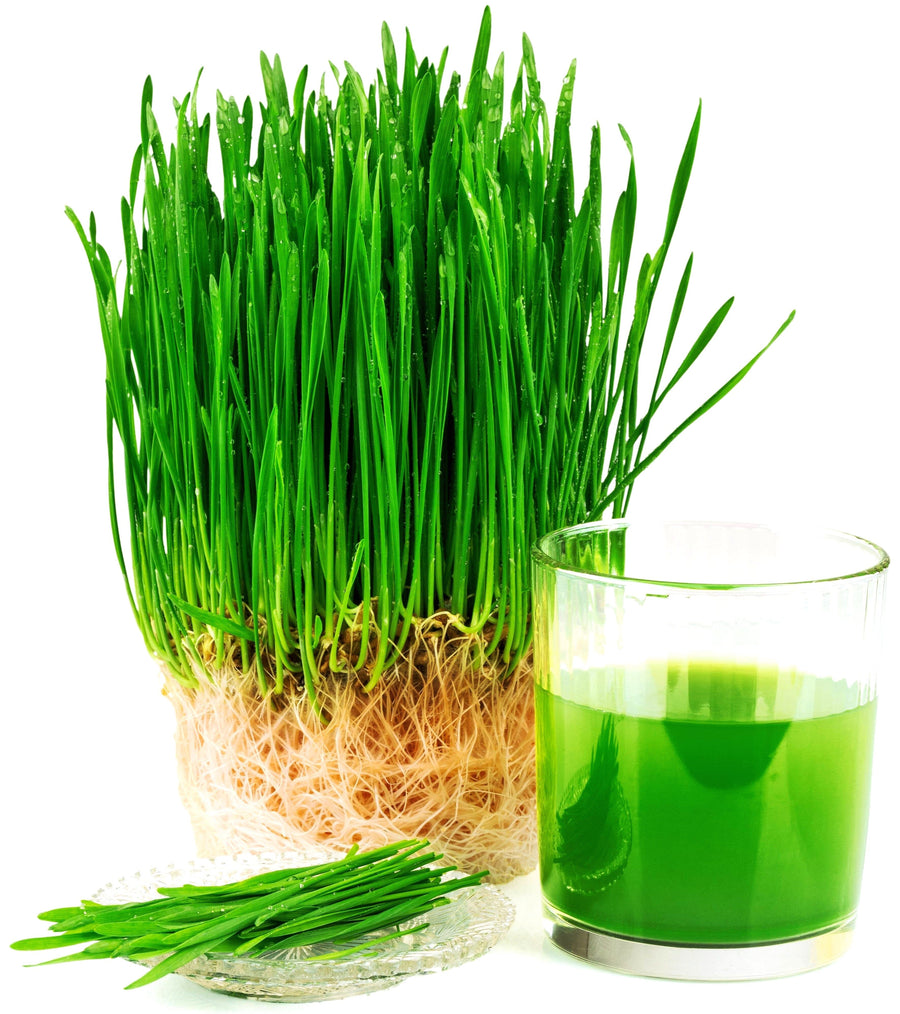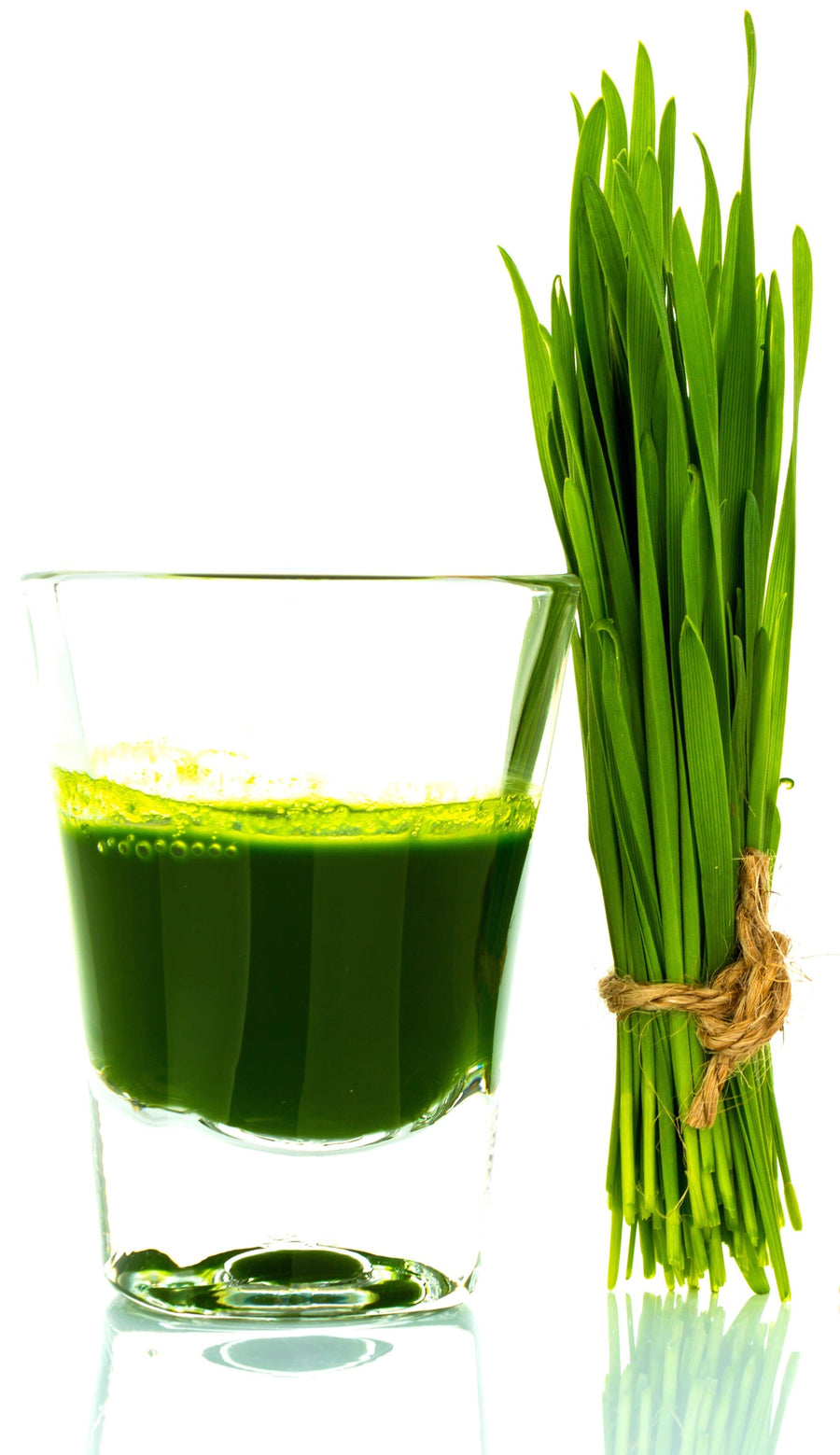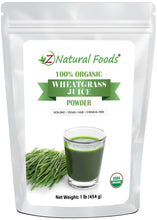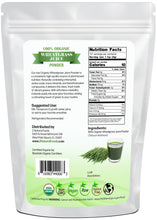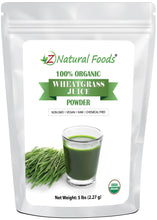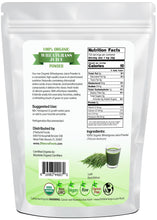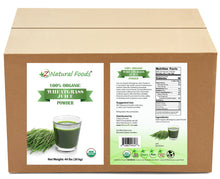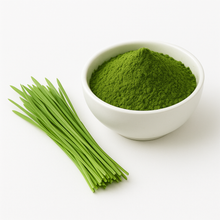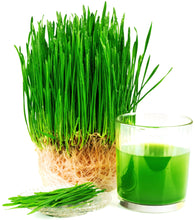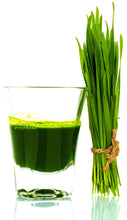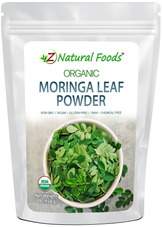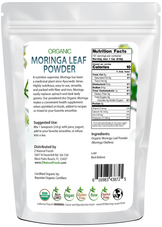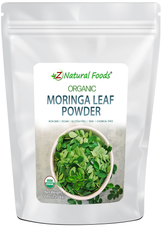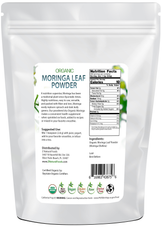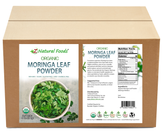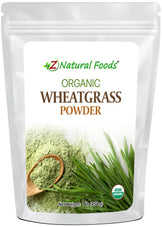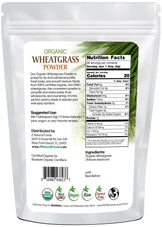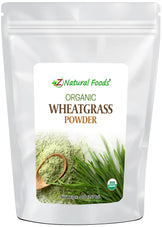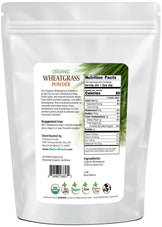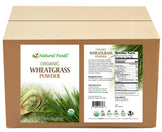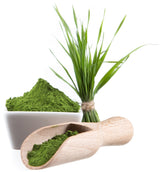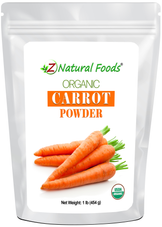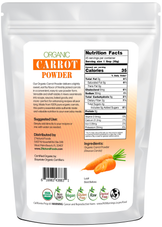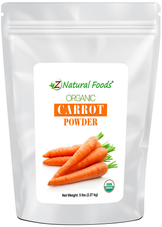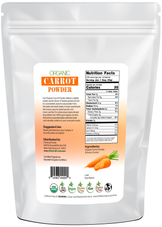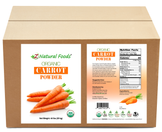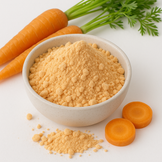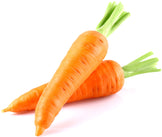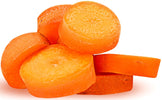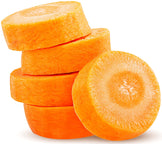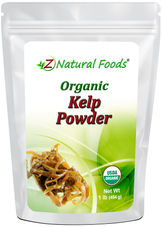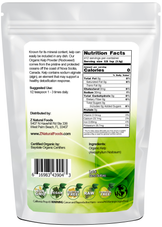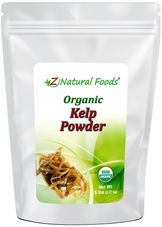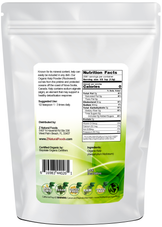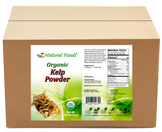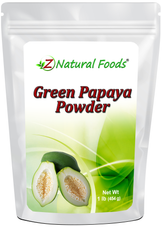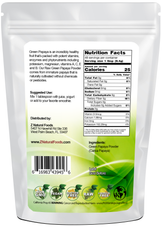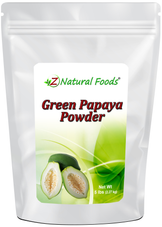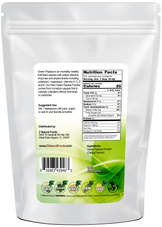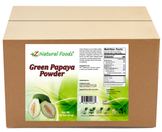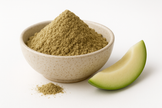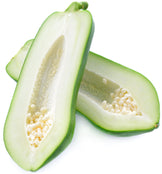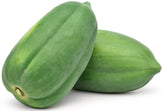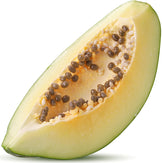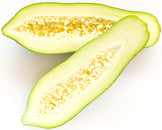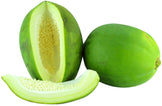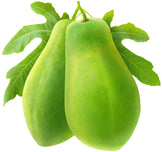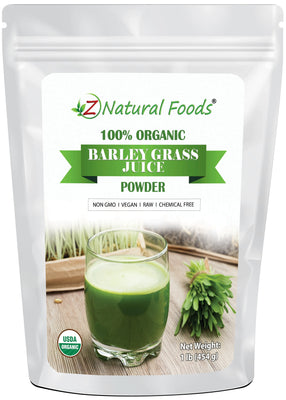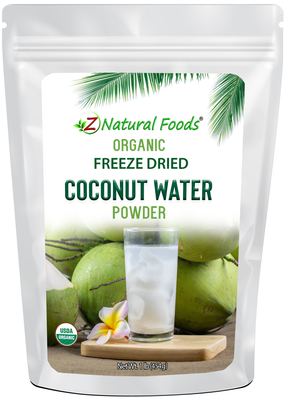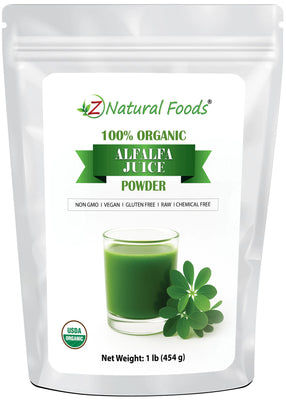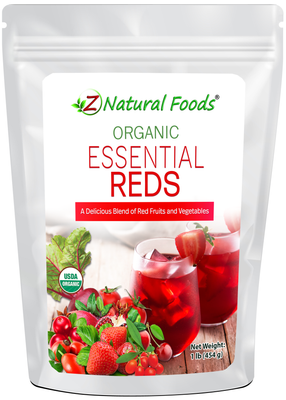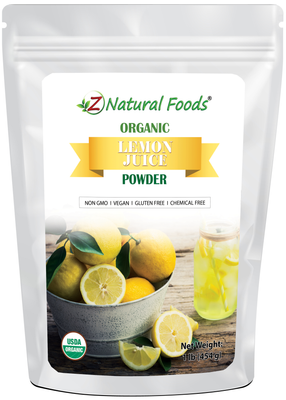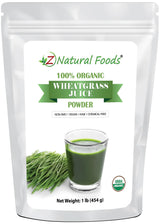About Product
Organic Wheatgrass Juice Powder is made from the young leaves of the wheatgrass plant (Triticum aestivum), harvested just before the grains develop. The fresh juice is carefully extracted, dried, and milled into a fine green powder, preserving its naturally vibrant color and earthy flavor. It blends smoothly into juices, smoothies, and teas for a refreshing boost.
Shelf-stable and versatile, wheatgrass juice powder can also be added to soups, salad dressings, or baked goods for an extra touch of green. With its clean taste and easy-to-use form, it’s a convenient way to enjoy wheatgrass as part of your everyday routine.
- Minerals: Magnesium, Phosphorus, Potassium, Zinc, Copper, Manganese, Selenium, Chromium
- Vitamins: Vitamin C, Thiamin, Riboflavin, Niacin, Pantothenic Acid, Vitamin B-6, Folate, Choline, Betaine, Vitamin A (RAE), Vitamin A (IU), Lutein & Zeaxanthin, Vitamin E, Beta Tocopherol, Gamma Tocopherol, Delta Tocopherol, Vitamin K
- Amino Acids: Tryptophan, Threonine, Isoleucine, Leucine, Lysine, Methionine, Cystine, Phenylalanine, Tyrosine, Valine, Arginine, Histidine, Alanine, Aspartic Acid, Glutamic Acid, Proline, Serine, Beta-Alanine
- Phytochemicals: Anthraquinones, Saponins, Avo-, Tannins, Alkaloids, Terpenoids, Phenolics, Superoxide Dismutase, P4D1, Chlorophyll
Taste, smell, texture, and color vary from batch to batch. Due to its nature, this powder tends to clump. If clumping occurs, lay the bag on a flat surface and place a towel over the bag. Then pound on the bag until the clumps break up. The towel will help protect the bag from damage. To further reduce clumping, push as much air as possible before sealing the pouch and store in the refrigerator or freezer.
Suggested Use: Mix one teaspoon with juice and yogurt or add to your favorite smoothie.
Mixing suggestions: To increase flavor and nutritional profile, combine with our organic freeze-dried strawberry powder.
Botanical Name: Triticum aestivum.
Other Names: Agropyron, Couchgrass, Cutch, Dog Grass, Durfa Grass, Quack Grass, Quitch Grass, Scotch Quelch, Twitchgrass, Witch Grass.
Parts Used: Raw Wheatgrass.
Ingredients: 100% Organic Wheatgrass Juice Powder.
Origin: Grown and dried in the USA and packaged with care in Florida, USA.
Certifications: Certified USDA Organic.
How to Maintain Optimum Freshness
- This product is packaged in airtight stand-up, resealable foil pouches for optimum freshness.
- Once opened, push the air out of the pouch before resealing it to preserve maximum potency.
- Keep your powder in a cool, dark, dry place.
This product is 100% natural and minimally processed:
Taste, smell, texture, and color vary from batch to batch. Go here to learn why our products may naturally vary.
The important protections we take to bring you safe and nutritious superfoods:
Please go here to discover the essential steps we take to deliver fresh, quality nutrition.
Bulk Quantities?
Need to order a large quantity of our products? We are happy to help! Please get in touch with our Bulk department to discuss the details.
* Product packaging, pictures, and origin may vary.
Sources & References
1. Murphy, Sean (2002-10-13). "Wheatgrass, healthy for the body and the bank account". ABC Landline. Retrieved 2006-10-06.
2. Meyerowitz, Steve (April 1999). "Nutrition in Grass". Wheatgrass Nature's Finest Medicine: The Complete Guide to Using Grass Foods & Juices to Revitalize Your Health (6th ed.). Book Publishing Company. p. 53. ISBN 1-878736-97-3.
3. "Site Dedication and Construction Preliminaries, 1921-1923". Ahr-kc.com. Retrieved 2013-04-19.
4."USDA Nutrient Database". Retrieved 2007-11-06.
5. "Wheatgrass". American Cancer Society. November 2008. Retrieved August 2013.
6. de Vogel, Johan; Denise S. M. L. Jonker-Termont, Martijn B. Katan,and Roelof van der Meer (August 2005). "Natural Chlorophyll but Not Chlorophyllin Prevents Heme-Induced Cytotoxic and Hyperproliferative Effects in Rat Colon". J. Nutr. (The American Society for Nutritional Sciences) 135 (8): 1995–2000. PMID 16046728.
7. Ferruzzia, Mario G.; Blakesleeb, Joshua (January 2007). "Digestion, absorption, and cancer preventative activity of dietary chlorophyll derivatives". Nutrition Research 27 (1): 1–12. doi:10.1016/j.nutres.2006.12.003.
8. "Wheat grass | Memorial Sloan-Kettering Cancer Center". Mskcc.org. Retrieved 2013-04-19.
9. Ben-Arye, E; Goldin, E; Wengrower, D; Stamper, A; Kohn, R; Berry, E (April 2002). "Wheat grass juice in the treatment of active distal ulcerative colitis: a randomized double-blind placebo-controlled trial". Scand J Gastroenterol 37 (4): 444–9. doi:10.1080/003655202317316088. PMID 11989836.
10. Melina, Vesanto, MS, RD & Davis, Brenda, RD: "The New Becoming Vegetarian", page 186-187. Healthy Living Publications, 2003.
11. "Nutrition Facts and Analysis for wheat grass". Nutritiondata.self.com. Retrieved 2013-04-19.
12. Boardman, N.K. 1980. Energy from the biological conversion of solar energy. Phil. Trans. R. Soc. London A 295:477–489.
13. Briggle, L.W. 1980. Introduction to energy use in wheat production. p. 109–116. In: Pimenter, D. (ed.), Handbook of energy utilization in agriculture. CRC Press, Inc. Boca Raton, FL.
14. Briggle, L.W. 1981. Wheat. Triticum aestivum. p. 67–70. In: McClure, T.A. and Lipinsky, E.S. (eds.), CRC handbook of biosolar resources. Vol. 11. Resource materials. CRC Press, Inc. Boca Raton, FL.
15. C.S.I.R. (Council of Scientific and Industrial Research). 1948–1976. The wealth of India. 11 vols. New Delhi.
16. FAO. 1980a. 1979. Production yearbook. vol. 33. FAO, Rome.
17. Dibb, D.W. 1983. Agronomic systems to feed the next generation. Crops and Soils Mag. (Nov):5–6.
18. Duke, J.A. 1978. The quest for tolerant germplasm. p. 1–61. In: ASA Special Symposium 32, Crop tolerance to suboptimal land conditions. Am. Soc. Agron. Madison, WI.
19. Duke, J.A. 1981b. The gene revolution. Paper 1. p. 89–150. In: Office of Technology Assessment, Background papers for innovative biological technologies for lesser developed countries. USGPO. Washington.
20. Duke, J.A. and Wain, K.K. 1981. Medicinal plants of the world. Computer index with more than 85,000 entries. 3 vols.
21. Gohl, B. 1981. Tropical feeds. Feed information summaries and nutritive values. FAO Animal Production and Health Series 12. FAO, Rome.
22. Hartwell, J.L. 1967–1971. Plants used against cancer. A survey. Lloydia 30–34.
23. Jenkins, B.M. and Ebeling, J.M. 1985. Thermochemical properties of biomass fuels. Calif. Agric. 39(5/6):14–16.
24. Kvech, O. 1979. The importance of crop residues in rotations of an intense farming system. Rostlinna Vyroba 25(10):1013–1022.
25. Palz, W. and Chartier, P. (eds.). 1980. Energy from biomass in Europe. Applied Science Publishers Ltd., London.
26. Reed, C.F. 1976. Information summaries on 1000 economic plants. Typescripts submitted to the USDA.
27. Stewart, G.A., Gartside, G., Gifford, R.M., Nix, H.A., Rawlins, W.H.M., and Siemon, J.R. 1979. The potential for liquid fuels from agriculture and forestry in Australia. CSIRO. Alexander Bros., Mentone, Victoria, Australia.
28. Watt, J.M. and Breyer-Brandwijk, M.G. 1962. The medicinal and poisonous plants of southern and eastern Africa. 2nd ed. E.&S. Livingstone, Ltd., Edinburgh and London.
29. http://www.academia.edu/5743489/Therapeutic_potential_of_wheatgrass_Triticum_aestivum_L._for_the_treat-_ment_of_chronic_diseases
30. http://www.chemijournal.com/vol2issue4/dec2014/2-3-9.1.pdf
* Reviews & Success Stories Disclaimer
Product reviews solely reflect the views and opinions expressed by the contributors and not those of Z Natural Foods. Z Natural Foods does not verify or endorse any claims made in these reviews. Statements have not been evaluated by the FDA and are not intended to diagnose, treat, cure, or prevent any disease or health condition.REFERRAL PROGRAM
Share your personal link to your friends and welcome them with rewards. Claim yours when they make their first purchase.

GIVE
$10 off discount

GET
$10 off discount
